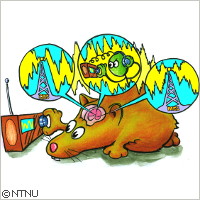Gamma waves give clue to information processing in brain
A team of Norwegian and Dutch researchers has discovered a mechanism that allows the brain to differentiate between different kinds of information. In the journal Nature they describe how gamma waves - specific kinds of brain waves thought to contribute to conscious perception - operate on different frequencies, depending on the kind of information they carry. The researchers measured brain waves in rats, focusing on three different parts of the hippocampus, the area of the brain that is largely responsible for long-term memory and spatial navigation. 'We found that there are slow gamma waves and fast gamma waves coming from different brain areas, just like radio stations transmit on different frequencies,' explained lead author of the study Laura Colgin, postdoctoral fellow at the Norwegian University of Science and Technology's Kavli Institute for Systems Neuroscience and Centre for the Biology of Memory. 'When brain cells want to connect with each other, they synchronise their activity,' Ms Colgin continued. 'The cells literally tune into each other's wavelength. We investigated how gamma waves in particular were involved in communication across cell groups in the hippocampus. What we found could be described as a radio-like system inside the brain. The lower frequencies are used to transmit memories of past experiences, and the higher frequencies are used to convey what is happening where you are right now.' This mechanism facilitates communication with distributed cell groups that process related information, making sure that different kinds of information do not get confused. While cells seem to be capable of switching quickly to tune in to slow or fast waves, the researchers believe that they cannot process both at the same time. 'This is like when you are listening to your radio and you tune in to a frequency that is midway between two stations - you can't understand anything - it's just noise,' explained Ms Colgin. 'Your current perceptions of a place would get mixed up with your memories of how the place used to be.' If different kinds of gamma waves are confused, mental disorders and abnormalities can be the result. 'We cannot tell for sure if it is this switch that is malfunctioning, but we know that gamma waves are abnormal in schizophrenic patients,' the lead author noted. 'Schizophrenics' perception of the world around them is mixed up, like a radio stuck between stations.' Traditionally, researchers assumed that information handling in the brain followed fixed routes. This new study suggests, however, that the brain is much more flexible. 'Among the thousands of inputs to a given brain cell, the cell can choose to listen to some and ignore the rest, and the selection of inputs is changing all the time,' summarised Dr Edvard Moser, director of the Kavli Institute for Systems Neuroscience. 'We believe that the gamma switch is a general principle of the brain, employed throughout the brain to enhance interregional communication.'
Countries
Netherlands, Norway



